#adverbs abound
Text
The Hate That You Carry
She was scared of him. And who could blame her? Worst thing was, he knew the look on her face, had seen that look countless times before. On his mother’s face. On Lenny's face. Had even felt it on his own face. Every time his father had taken out his anger on them.
Part 3 of Always One Bad Day Away (Part 2 of the series Billy Butcher - A Prequel)
Word count: ~5k
Rating: Mature
A/N: It's me again! Feedback is always greatly appreciated ;D
Tag list: @amethystpagan

"You know you really didn’t have to do all this, right? There’s no need to impress me.”
Becca entwined their fingers as they left the restaurant, happily smiling up at Billy. Her cheeks had a pink tinge to them, but it was only partly due to the wine she’d had.
“Whatever do you mean?” Billy smirked back cheekily.
“Well, we don’t usually go out like this. And you know I don’t need fancy dates, either.”
“Oh, but this is a special occasion, innit? One-year anniversary and all?”
“One-year… What? Billy, that’s not for another six days,” she laughed softly and tilted her head in question.
“No, it’s not.”
“No, I’m pretty sure we had our first date on the 7th of September. We rented that stupid action flick, got Chinese take-out, and spent the night not watching it.”
Keep Reading on AO3
#liz writes#the boys#the boys fanfic#Billy Butcher/Becca Butcher#Billy Butcher#Becca Butcher#Sam Butcher#Connie Butcher#original characters#hurt/comfort#whump#fluff if you squint#canon typical violence#past character death#lot's of swearing#introspection#trying and failing to write a cockney accent i'm so sorry#creative punctuation#adverbs abound#story: Always One Bad Day Away#series: Billy Butcher - A Prequel
13 notes
·
View notes
Text
I feel like Anne Carson’s writing is the antithesis of earnest Hemingway writing and furthermore I feel like. Slightly vindicated in my former HATRED of Hemingway style. Not his style itself but how his style was used to teach writing. When I was in high school my sophomore creative writing teacher loved Hemingway and loved to talk about axing adverbs and adjectives and I despised it. Despised it. And here anne carson went describing someone watching someone else fragilely. Adverbs and adjectives abound in her writing and I think THIS god THIS is what I was missing. This is what I was looking for.
1 note
·
View note
Text
2 Corinthians 9:8–9
8 δυνατεῖ δὲ ὁ θεὸς πᾶσαν χάριν περισσεῦσαι εἰς ὑμᾶς, ἵνα ἐν παντὶ πάντοτε πᾶσαν αὐτάρκειαν ἔχοντες περισσεύητε εἰς πᾶν ἔργον ἀγαθόν, 9 καθὼς γέγραπται·
ἐσκόρπισεν, ἔδωκεν τοῖς πένησιν,
ἡ δικαιοσύνη αὐτοῦ μένει εἰς τὸν αἰῶνα.
My translation:
8 And God is able to cause all grace to overflow unto you, in order that in everything, at all times, having all sufficiency, you might overflow unto all good work, 9 just as it has been written:
“He scattered, he gave to the poor,
his righteousness remains into the age.”
Notes:
9:8
‘δέ is emphatic (“indeed”) rather than merely continuative (“and”)’ (NIGTC).
δυνατέω (3x, all by Paul) is, “I am able” (most translations), from δυνατός “I am able, powerful” (cf. ἀδυνατέω, 2x, “I am not able”); LSJ says it is equivalent to δύναμαι. The subject of the present δυνατεῖ is ὁ θεὸς. The aorist infinitive περισσεῦσαι (from περισσεύω, here transitive: “I cause to abound/overflow”; ICC: “supply you abundantly”) is complementary with δυνατέω. χάριν, modified by the attributive πᾶσαν, is the direct object of the infinitive. If περισσεύω is taken in the sense “overflow”, then the prepositional phrase εἰς ὑμᾶς is spatial; if “abound”, then εἰς denotes advantage.
ἵνα + subjunctive indicates purpose or possibly result. ἵνα and verb are separated by three modifiers: the prepositional phrase ἐν παντὶ, the temporal adverb πάντοτε (“always”), and present participle ἔχοντες (from ἔχω). The participle modifies the present subjunctive περισσεύητε (from περισσεύω; NASB: “you may have an abundance; HCSB: “you may excel”; NET: “you will overflow”; ICC: be prolific”). and could denote means (NRSV: “by always having enough of everything”) or cause (NET: “because you have enough of everything”). The preposition ἐν with substantival παντὶ indicates reference/respect (ICC: “in every respect”; NIGTC: “in every circumstance”). HCSB takes ἐν παντὶ with περισσεύω but πάντοτε with ἔχω; NIV takes both modifiers with περισσεύω, while NRSV, NASB, NET take both with ἔχω.
The present-tense of the verb and participle indicates ongoing abundance and sufficiency.
ἡ αὐτάρκεια (2x, both by Paul) means, ‘state of having what is adequate’ (BDAG), i.e., “sufficiency”, from αὐτάρκης (1x) “self-sufficient, content”, itself from αὐτός + ἀρκέω (8x) “I am sufficient, enough”. In Greek philosophy it denoted, “self-sufficiency”, but here the sense is probably more like, “sufficient supply” (ICC), “ample resources” (NIGTC). αὐτάρκειαν, modified by attributive πᾶσα��, is the direct object of the participle ἔχοντες above.
The preposition εἰς with ἀγαθόν, modified by attributive πᾶν and ἔργον (“every good work”), modifies περισσεύω above and denotes purpose.
9:9
The correlative adverb καθὼς with perfect γέγραπται (from γράφω) introduces a verbatim quotation from the LXX of 111:9 (112:9 MT). The perfect-tense of the verb is stative (“it stands written”, NIGTC) and indicates the ongoing relevance of Scripture.
σκορπίζω (5x) is, “I scatter”, often used of scattering seed, here in the sense of, “disperse” (BDAG), “disseminate”; ESV: “distributed freely”; NET: “scattered widely”. In the original Psalm, the unexpressed subject of the aorist ἐσκόρπισεν is ἀνὴρ ὁ φοβούμενος τὸν κύριον (“the man who fears the LORD”, v. 1), and so a human (rather than divine) subject is probably intended here as well.
The hapax legomenon ὁ πένης is, “poor man”. The term refers to one who toils for his daily bread, while πτωχός to those who are destitute (EGGNT). The indirect object of the aorist ἔδωκεν (from δίδωμι, a kappa-aorist) is τοῖς πένησιν. The aorist-tense of both verbs is gnomic (translated by NIGTC as present-tense, “He scatters ..., he gives”); the two verbs may form a hendiadys (“they distributed widely in their giving”).
ἡ δικαιοσύνη is the subject of the present μένει (from μένω; most translations: “endures”; NET: “remains”; ICC: “lasts”). In the context of 2 Corinthians 9, the sense of the noun is probably, “mercy, charitableness” (BDAG). The genitive αὐτοῦ is possessive or subjective, and refers to ἀνὴρ ὁ φοβούμενος τὸν κύριον (see above). The prepositional phrase εἰς τὸν αἰῶνα (lit. “into the age, into eternity”; most translations: “forever”) is temporal. What does this phrase mean? ICC and NIGTC suggest an application restricted to this life (‘the acts of the righteous man continue throughout his life’, ICC), although the phrase could also refer to eternal remembrance of such piety, or perhaps eternal rewards for it.
0 notes
Text
영원히 / 평생
Eternal / Forever in this lifetime.
(Bear with me, I'll get to this part)
I've been trying to collect all the memorable lines from 2521 and what strucked me the most was the literal translation of the subtitles.
It irkes me as someone who's a beginner learner of this beaufitul language that majority of them weren't as it was said.
I remember back in episode 9, Yijin said:
난 널 사랑하고있어, 나 희도.
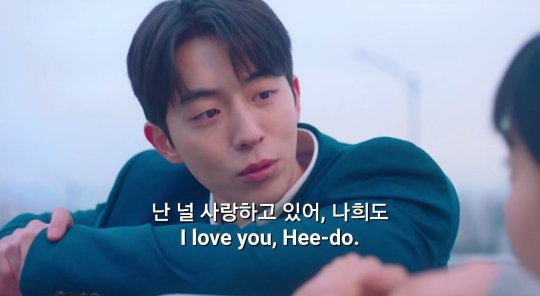
It literally translates as:
I AM IN THE STATE OF LOVING YOU
or
I AM LOVING YOU
It was in Continous Present Progressive Tense.
Why was this important?
We usually hear 사랑해요 in korean dramas when they confess to each other. I love you. In a present verb with no specific time. Just now. In this moment. They love each other or that person loves that someone.
But here in this scene,

Yijin affirmed the he loves Heedo. He is in the state of loving her.
It gives weight that his love is a literal verb in process.
Present Tense vs Continous Progressive Tense
(but here's the mind boggling part about grammar.)
In English, Present Tense is a literal event of what is happening right now at this very moment. For Continous Progressive Tense, it means that it will continue to happen in the future too.
However, in Korean grammar, there's a BIG difference. For Present Tense, it is what it is, but for Continous Progressive Tense, it doesn't have definite meaning for the future.
🙃🌈💔✂
Yup. I know.
I was wondering if this was intentional? Like, I called it at that time when I was trying to dissect their lines, but I didn't actually know it'll be foreshadowed. I hope I was just overthinking.
So, let's talk about forever this time.
영원히 means forever in eternal sense.
평생 means forever in this lifetime or in my whole life.
The former one is used anywhere, but the latter one is used only in adverbs. But why does this even matter? Haha!
I differentiated it because BaekDo used it twice in the drama.
One in episode 10, where Heedo said 영원하자 and secondly, Yijin said it in episode 15:
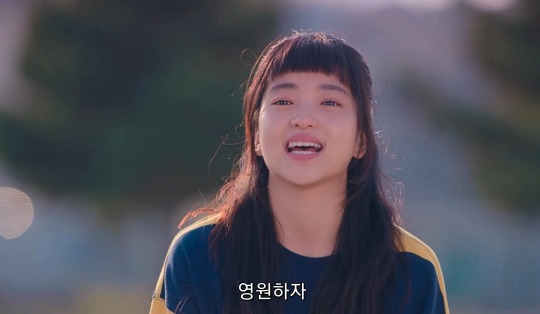

For episode 10, the english subtitles originally was:
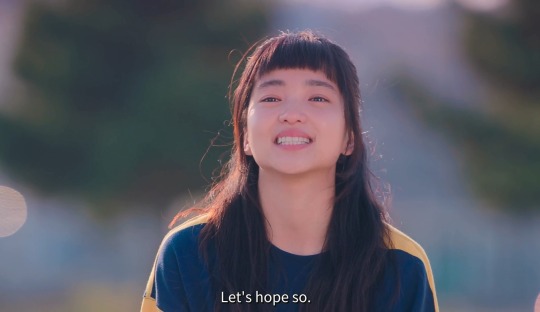
But for episode 15, the translator used the literal meaning...

They said they loved each other eternally, but what gives?
At what cost for us?
What the hell does the weight and meaning of these words even mean??!! 😭
I am obviously still in disraught. It's been two weeks now. I am literally missing having mental gymnastics every weekend, but the trauma. Well...
I'll save another blog entry for the emotional unpacking of the whole drama, but I'm not done yet here.
Okay, going back to episode 10 where Heedo said, Why does it feel like this moment will last forever?
Yijin replied:
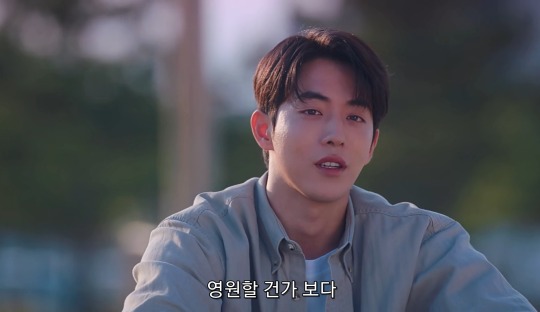
It literally meant:
I guess it'll last forever.
but in the english subtitles shown was:

Closer, but a bit vague. So, I'll still take it.
But here's what I'm actually trying to say:
The subtitles didn't give majority of their words justice and I do think they still love each other at the present time.
(I'll make a separate entry to explain why I think they still love each other)
Though, I strongly believe it is now a different kind of love. A love that abounds more for other people than to themselves.
And I think that's why majority of the viewers were still in bereft about their relationship because it wasn't strongly implied.
We were left grasping and hanging looking at their future selves. Imagine, what they had was one of the beautiful things in the world, but the circumstances took it from them.
I don't actually resent the break up. Their reasons were more than enough. I agree that they need to be apart at that time. The solution was for them to communicate and to get treatment 'cause obviously they both do have traumas.
Yijin with his ptsd. Heedo with her past experiences with her mom.
They're both still broken people, but I know that doesn't mean their relationship would never work. It's just that... their characters made to the point of resolve without coming it across to the viewers that they did heal after all those years.
So, what am I rambling?
Haha!
I just can't believe how we humans tend to brush off the inevitable possibilities of life that when we speak words, the weight of it, the meaning, and the importance it has to people will literally break them into pieces.
Forever?
Who are we kidding...
"...the moments when I dared to say everything would last forever. I loved living in that illusion." -Na Heedo
#twenty five twenty one#Twenty five twenty one finale#Twenty five twenty one episode 16#Twenty five twenty one ep16#스물다섯 스물하나#김태리#남주혁#nam joo hyuk#kim tae ri#skawngur#korean drama#kdrama
53 notes
·
View notes
Text
1. Malayalam (Aug 6th, 2020)
Malayalam is a relatively young Dravidian language believed to exist since the 16th century. “Mala” is mountain and “aalam” is region. The language has its roots in Tamil and later incorporated in it a large number of Sanskrit words.
This blog is intended to help one understand spoken Malayalam and eventually to speak the language: “Listen before you speak” . After you learn a number of commonly used nouns, verbs, adjectives, adverbs etc. followed by examples of simple sentences. Each lesson is accompanied by its own audio file. We will build the vocabulary over a period of time. Feedback and suggestions from readers will be used in planning future content. The target audience includes those who want to learn or improve their spoken Malayalam as well as tourists who plan to visit Kerala in future.
The syntax of Indian languages is quite different from that of English. There are many more letters - 51 plus many more in Malayalam as opposed to 26 in English. There are many other subtle nuances in the usage of words and expressions. Colloquial and regional expressions abound in the spoken version. Familiarity with these will come with time and experience.
3 notes
·
View notes
Note
love the meta asks for writers! can I ask 2 and 7?
They’re quite good questions, aren’t they? I hope I get to answer some more of them (hint hint, you guys)
2. Tell us about what you’re most looking forward to writing – in your current project, or a future project.
I look forward to writing more about Dewey! Dewey, Dewey, Dewey. He’s the one constant in all my immediate plans, both the Dicked Down epic (which needs more of him at this point, can’t all be Ernest-smut and Frank-bickering), the third instalment of the Skyrim AU, and then there’s a shameless smut fic lurking in the distance, a nice, short, wholesome Kit/Dewey one. I say wholesome, because there’s no angst. Just some good ol’ fashioned pegging. Been too long since I wrote that.
7. What do you think are the characteristics of your personal writing style? Would others agree?
This is a tough one. I suppose we better let the cat out of the bag first: a dangerous tendency towards purple-ish prose, if I’m not veeeery careful, as in ‘said is really, really dead’, adverbs and adjectives abound, commas everywhere, and the online thesaurus is my BFF, because god forbid I use the same word twice in quick succession. It’s all very descriptive a lot of the time (that happens when you write smut, I feel). I am Ernest Hemingway’s worst nightmare, and Oscar Wilde’s greatest fan, stylistically. I just really like language, okay? I want to explore it, celebrate it, not whittle it down to the bone.
As for what other see? One of the greatest compliments I ever received for my writing was about a decade ago (yes, I am old, and I have been writing since I was 13), when someone told me they admired my ability to combine all the different aspects I work with - action, dialogue, romance, smut, humour - into a cohesive, balanced whole. I remember floating on air for a whole day after getting that comment. I don’t even consciously try to do that, I barely think about any of this when I’m writing, I just try to make it into something I would want to read myself, and hope for like-minded people to enjoy the show.
2 notes
·
View notes
Text
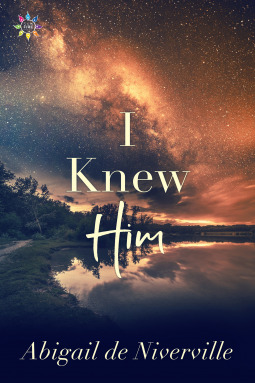
Rating: 3 stars
Goodreads Summary:
“In his senior year of high school, Julian has one goal: be invisible. All he wants is to study hard, play basketball, and pretend he’s straight for one more year. Then, he can run away to university and finally tell the world he’s bisexual. And by “the world,” he means everyone but his mom and best friend. That’s two conversations he never wants to have.
When he’s talked into auditioning for the school’s production of Hamlet, Julian fears that veering off course will lead to assumptions he’s not ready to face. Despite that, he can’t help but feel a connection to this play. His absent father haunts him like a ghost, his ex is being difficult, and he’s overthinking everything. It’s driving him crazy.
The decision to audition leads Julian on an entirely different path. He’s cast as Hamlet, and the boy playing Horatio is unlike anyone Julian has met before. Mysterious and flirtatious, Sky draws Julian in, even though he fears his feelings at the same time. As the two grow closer, Julian begins to let out the secrets he’s never told—the ones that have paralyzed him for years. But what will he do if Sky feels the same way?”
Netgalley gave me this arc in exchange for an honest review.
I Knew Him is an okay book. With flaws and multiple hobbies, Julian is an interesting protagonist. Julian loved stars and musicals. Sky is a developed love interest with emotional scars. I enjoyed most of their scenes, particularly the ending of the play.
As for the other characters, Julian’s dad, David, and Kelsey provided surprising, interesting, emotional scenes. Unfortunately, many of Julian’s friends are underdeveloped. Despite her significance, Lucy receives little characterization and its difficult to determine why Julian liked her in the first place. Belle and Dan are Julian’s friends, but they only appear at the beginning and end of the story.
Will also lacks characterization. Additionally, Will discusses a certain person with Julian on many occasions, giving this individual significance. However, these discussions are pointless because the person never appears in the story.
Some lines are poetic and lovely. However, adverbs and filter words abound.
Despite the issues above, I enjoyed the book. Julian and Sky’s romance outshines the flaws.
#Abigail de Niverville#I Knew Him#book review#teen book review#young adult book review#bookish#bookblr#lgbt ya book#3 stars#young adult literature#netgalley#reviewers on tumblr
1 note
·
View note
Text
Forbidden Formats: The Risks and Rewards of Uncommon Narrative Structures - By Bonnie Randall…
Forbidden Formats: The Risks and Rewards of Uncommon Narrative Structures – By Bonnie Randall…
On Fiction University:
Not every story needs to be told in the Three Act Structure.
Every fiction writer from veteran to novice knows there’s a collection of “don’ts” when writing.
Don’t use adverbs
Don’t use adjectives
Don’t use any tag other than ‘said’.
Don’ts abound in narrative structures, too, (how the story is delivered). Nevertheless, this summer I’ve read several bodies of fiction…

View On WordPress
0 notes
Text
DAY 3544
Puri Pai, Thailand Dec 7, 2017 Thu 8:38 pm local time

Nature stares at you from glass panes .. distant .. peaceful and calm .. does it ever know the calm in us .. or us in it .. looks could deceive .. maybe there is turmoil .. a turmoil that creates visions of a picturesque peace .. peace that from the length of its vision looks almost manufactured for our cared and considered belief ..
Best not to delve deep into subjective analysis .. at times it destroys perceived belief .. let it be .. let it be .. sang the Beatles .. ever wondered why ?
I don’t ..
Maybe they saw something that they wished to hide within their lyrics ..��
“lady in the sky with diamonds” was hidden expression .. LSD .. and its prominence in those times .. lyricists have that creative guile and commended ability to do so .. such a gift ..
Most revolutionary lyrics and songs of those times did .. the objective being not to disclose the revolt, yet revolt .. not to disclose, for that was forbidden by the invader or them that ruled or dictated .. but now when rulers and dictators are limited, morals and social norms take over expression .. addressing a cause, a noble need for humanity .. something that needs to be spoken yet spoken silently .. penetrating satirical verses from poets .. saying it but not saying it ..
Genius .. simply that .. genius .. !!!
Yet nothing gets past the genius of nature .. nothing whatsoever .. celebrated, destructive, amorous, beguiling, illustrative .. just an endless dictionary of adjectives and adverbs .. abounding in its descriptions ..

Good night .. very early call tomorrow .. and the adventure begins ..

Amitabh Bachchan
170 notes
·
View notes
Text
I Never Knew How to Save You
"So, you’re happy. [...] One year ago today, you got ten of our brother’s killed, and you’re happy."
Part 2 of Always One Bad Day Away (Part 2 of the series Billy Butcher - A Prequel)
Word count: ~8.5k
Rating: Mature
A/N: It's me again! Feedback is always greatly appreciated ;D
Tag list: @amethystpagan

“You want the garlic minced or pressed, luv?”
“Definitely minced! I don’t think I even own a garlic press.”
“I was afraid you’d say that.”
Becca chuckled at Billy’s exhausted sigh as she bustled about the kitchen, always keeping an eye on the boiling pasta. She’d put him in charge of cutting vegetables, half of which he’d never even heard of before. It should have been at least a bit disconcerting how skilled he was with a knife while being all fingers and thumbs when it came to cooking. For some reason it wasn’t, though. Becca wasn’t the best of cooks, either, but at least she knew how to follow basic recipes.
Keep reading on AO3.
#liz writes#the boys#the boys fanfic#Billy Butcher/Becca Butcher#Billy Butcher#Becca Butcher#Sam Butcher#Connie Butcher#original characters#hurt/comfort#whump#fluff if you squint#canon typical violence#past character death#lot's of swearing#drug use#introspection#trying and failing to write a cockney accent i'm so sorry#creative punctuation#adverbs abound#story: Always One Bad Day Away#series: Billy Butcher - A Prequel
4 notes
·
View notes
Text
plenty (n.)
luxury, plethora, quantity, torrent, affluence, fruitfulness, mass, opulence, prosperity, volume, full house
mid-13c., "abundance; as much as one could desire; an ample supply," from Old French plentee, earlier plentet "abundance, profusion" (12c., Modern French dialectal plenté), from Latin plenitatem (nominative plenitas) "fullness," from plenus "full, filled, greatly crowded; stout, pregnant; abundant, abounding; complete," from PIE root *pele- (1) "to fill."
From early 14c. as "a large amount, a great deal." The meaning "condition of general abundance" is from late 14c. The colloquial adverb meaning "very much" is first attested 1842. Middle English had parallel formation plenteth, from the older Old French form of the word.
0 notes
Text
2 Corinthians 8:13–15
13 οὐ γὰρ ἵνα ἄλλοις ἄνεσις, ὑμῖν θλῖψις, ἀλλʼ ἐξ ἰσότητος· 14 ἐν τῷ νῦν καιρῷ τὸ ὑμῶν πε��ίσσευμα εἰς τὸ ἐκείνων ὑστέρημα, ἵνα καὶ τὸ ἐκείνων περίσσευμα γένηται εἰς τὸ ὑμῶν ὑστέρημα, ὅπως γένηται ἰσότης, 15 καθὼς γέγραπται· ὁ τὸ πολὺ οὐκ ἐπλεόνασεν, καὶ ὁ τὸ ὀλίγον οὐκ ἠλαττόνησεν.
My translation:
13 For it is not in order that there might be rest for others, and pressure for you, but it is from equality; 14 at the current season your abundance is unto the lack of those ones, in order that also the abundance of those ones might be unto your lack, so that there might be equality, 15 just as it has been written:
“The one gathering the much did not have an abundance, and the one gathering the little did not have less.”
Notes:
8:13
This verse is elliptical, and verbs must be supplied in translation.
οὐ negates an implied verb; NRSV: “I do not mean”; NASB: “this is not”; NIV: “Our desire is not”; NET: “I do not say this”; ICC: “the aim is not”. The οὐ ... ἀλλά construction indicates strong contrast.
ἵνα + an implied subjunctive such as ᾖ or γένηται indicates purpose or result. ἄνεσις (“relief, rest”; see note on 7:5) is a predicate nominative of the implied γένηται. ἄλλοις is substantival and a dative of advantage.
θλῖψις (“hardship”, NRSV, NASB, HCSB) is another predicate of the implied γένηται above. ὑμῖν is a dative of disadvantage.
ἡ ἰσότης (3x) is, “equality, fairness” (BDAG), from ἴσος (8x) “equal, equivalent”. BDAG says ἐκ here means, “according to, in accordance with” (cf. v. 11), and translates the preposition ἐξ with genitive ἰσότητος, “on the basis of equality”. The phrase modifies another implied verb such as an impersonal ἐστιν (HCSB: “it is a question of equality”).
8:14
The adverb νῦν functions attributively with τῷ ... καιρῷ (“at the present time”, NIV, ESV, HCSB, NET; “at the present season”, CGT). The prepositional phrase ἐν τῷ νῦν καιρῷ temporally modifies the implied verb below. Some commentators take the phrase broadly to refer to the present age of the kingdom; others more narrowly to the present circumstances of the Corinthians.
τό περίσσευμα (5x) is, “abundance, fullness” (BDAG), from περισσεύω “I abound, overflow”. ὑμῶν modifies τὸ ... περίσσευμα as a possessive genitive. τὸ ... περίσσευμα is the subject of an implied verb (see below).
τό ὑστέρημα (9x) is, “need, want, deficiency” (BDAG), from ὑστερέω (16x) “I lack” (cf. ἡ ὑστέρησις, 2x, “poverty”). The far-demonstrative pronoun ἐκείνων is substantival (lit. “of those ones”; most translations, “their”), referring to the Jerusalem Christians, and modifies τὸ ... ὑστέρημα as a possessive genitive. The preposition εἰς here denotes goal or purpose. A verb must be supplied with the prepositional phrase εἰς τὸ ἐκείνων ὑστέρημα; ICC suggests ‘γίνεται or γενήσεται to correspond with the γένηται of the two following clauses’. NASB: “your abundance will serve as assistance for their need”; NIV: “your plenty will supply what they need”; HCSB: “your surplus is available for their need”.
ἵνα + subjunctive indicates purpose.
καὶ is adjunctive (“also”); context suggests, “in turn”. Corresponding to “at the present time” above, here there is an implied time modifier such as “later on”, “some day”, or “at some future date” (NIGTC).
The substantival far-demonstrative pronoun ἐκείνων is possessive with τὸ ... περίσσευμα (“abundance”; see above), which is the subject of the aorist infinitive γένηται (from γίνομαι).
ὑμῶν is a possessive genitive with τὸ ... ὑστέρημα (“need”; see above). The prepositional phrase εἰς τὸ ὑμῶν ὑστέρημα indicates goal or purpose with γένηται above.
ὅπως (“so that”) is perhaps employed for variety’s sake since ἵνα was just used (BDF §369.4).
The predicate of the aorist subjunctive γένηται (from γίνομαι) is ἰσότης (“equality”; see note on v. 13).
8:15
The comparative adverb καθὼς with perfect γέγραπται (from γράφω) is a standard formulation to introduce an OT citation, here from Exodus 16:18. ‘The term γέγραπται, common in the papyri in reference to the authoritative character of a document, points to the permanence of the scriptural text as well as its authority (“it stands written”)’ (NIGTC). The citation is the same as the LXX but for word order and the replacement of ἔλαττον (from ἐλαχύς, not in NT; LSJ: “small, short, mean, little”) with ὀλίγον. The context in Exodus has to do with the gathering of manna in the desert.
The article ὁ is substantival, and a participle must be supplied such as ἔχων, or more probably, συλλέξας (from συνέλεξαν “I gather”, from Ex. 16:17). The article τὸ substantizes the adjective πολὺ (lit. “that which is little”) to function as the direct object of the implied participle (“the one who gathered much”; sim. most translations). ὁ is the subject of the negated aorist οὐκ ἐπλεόνασεν (from πλεονάζω “I abound”; here, “I have too much”, BDAG; see note on 4:15).
The hapax legomenon ἐλαττονέω is, “I have less, have too little” (BDAG), from ἐλάσσων (4x) “less, smaller, poorer” (cf. ἐλάχιστος, 13x, “least”). As above, ὁ functions as a subject, with an implied participle such as συλλέξας (“gathered”). τὸ ὀλίγον (“little”) is the direct object of the participle. ὁ is the subject of the negated aorist οὐκ ἠλαττόνησεν.
0 notes
Text
“DID YOU PUT YOUR NAME IN THE GOBLET OF FIRE?!”
I reblogged a post earlier today talking about how some movies are actually much better than the books they are derived from, and it got me thinking about this infamous moment from Harry Potter and the Goblet of Fire. Now, I really love thinking about media, and one of my pet projects is the translation of stories from one medium to another.
One of my pet peeves is when people sink into that “the books are better” mentality, often condemning the movies simply because they changed things from the books
This line is a great example of this mentality in action. It’s one of those things that bothers people immensely about the Goblet of Fire movie. People don’t like this particular line for one simple reason. In the book, the scene goes like this:
“Did you put your name in the Goblet of Fire, Harry?” Dumbledore asked calmly.” (pg 242, GoF)
While in the movie, Michael Gambon grabs Harry by the shoulder, asks him the question quite angrily - almost shouting - and shakes him as he does. Here’s the scene and its lead-up so you know I’m not trying to misrepresent it.
Fans like to hold this moment up as emblematic of how the Harry Potter movies don’t understand the characters - e.g., they think Dumbledore is angry and panicky while he’s much calmer in the books. I think this moment is emblematic of how people don’t understand how adaptations work.
To be clear, I’m not defending the adaptation of GoF as a whole. Some things they changed were, in fact, very stupid. Beauxbatons’ entrance (and the fact that they are suddenly all girls) is stupid. I cannot think about the magical sighing butterfly ballet-run without cringing.
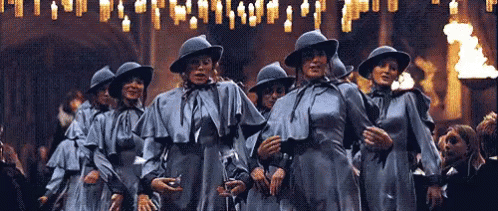
What are you DOING.
But that moment would have been cringey even if this movie hadn’t been an adaptation. So, GoF is neither my favourite book nor my favourite movie in the series. It is, however, this line from that book and that movie that concerns me, because it’s specifically this line that Got Meme’d On
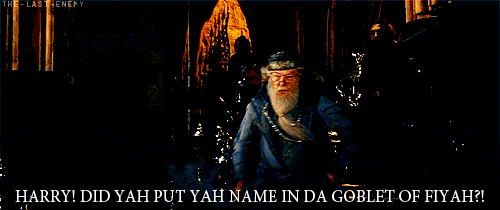
This gif is from an article whining about the differences between the book and the movie, by the way. It starts out trying to conjure some reasons as to why the differences are bad and then gives up halfway through, saying “Neville gives Harry the Gillyweed and not Dobby!!” and not explaining why that is bad. (As if that’s not a great way to nod to Neville’s fascination with herbology, a good way to avoid the complicated and foreshadowy question of how Dobby comes back to Hogwarts with Gillyweed at just the right time, which was stupid, and it’s also an excuse for one of the funniest moments of the movie when Neville goes “OH MY GOD I’VE KILLED HARRY POTTER”, which the article includes as a clip without realizing how much it undermines its own argument.)
Anyway, what I’m trying to prove is that people are so adamant about accuracy from book-to-movie that they’ll get pissed about directors neglecting a single adverb, without realizing that the new version makes more sense.
So here are some reasons why the scene not only makes sense in the film context, but also might be better than the original scene. These reasons also connect to some larger thoughts about adaptations and why people need to rethink how they watch them.
1) Movies build tension (and represent time) differently from books.
Books have an odd relationship with time. There’s basically no correlation between reading a sentence and the length of the action the sentence represents. Reading “Barty Crouch spent a year slowly bleeding out in a magical cabinet” does not cause a year of real time to pass. Movies, meanwhile, have a predominantly one-to-one relationship with time: what you see on the screen takes about as much time as it “really” would, and when it doesn’t (like when there’s a jump cut, a slow-mo moment, or what we call “overcrank” to make the footage look sped up) it’s quite jarring. Depicting a significant time jump in films is often difficult, and must be obviously signified by weather changes, costume changes, or even words on the screen (Targoviste, Wallachia, 1475....)
Another important thing to keep in mind is that books let us see into the main character’s head, particularly in Harry Potter where we get a lot of Harry’s inner thoughts. Movies can’t do that as well without voiceover narration or really stellar directing, which Harry’s movies don’t have (the directing is like a solid 7/10 throughout the series). This allows books to build internal tension much more easily: a character can build tension simply through the escalating anxiety in their thoughts.
Because suspense and tension are things that build up in relation to time (think of a bomb counter ticking down; the lower it goes, the higher tension builds), tension can be built differently in books and movies. It’s hard to describe abstractly, so I’ll show you what I mean.
In the book, the tension of these scenes builds across two chapters. The first chapter, “The Goblet of Fire”, ends with Harry’s name coming out of the goblet in the hall. The last words of the chapter are literally Dumbledore reading the name “Harry Potter” (238). The next chapter, “The Four Champions”, spends about seven or eight pages on the description of Harry climbing the stairs, entering the office, being mistaken for a messenger by the other champs (lol), and the sequence of the teachers discussing what to do about Harry where Dumbledore drops the line ever so “calmly”. The chapter ends with Ron refusing to believe that Harry didn’t put his name in the Goblet - the last words describe “the dark red velvet curtains...hiding one of the few people he had been sure would believe him.” (252)
The first chapter builds tension in a movie-ish way, describing action after action without too much fluff or reflection. The names come out of the goblet, one after the other - that’s our bomb ticking down, as the champions are selected. J.K. ends the chapter on the words “Harry Potter” because that’s the bomb going off. HOLY SHIT HE’S A TRIWIZARD CHAMPION I DID NOT EXPECT THIS BY LOOKING AT THE BOOK COVER (I’m being facetious: that’s actually perfectly fine writing and a reasonable surprise for a first-time reader.)
So the bomb goes off. Chapter ends! Blank space for you to go “oh crap!” Next chapter.
The next chapter begins in the very next moment, with Harry’s reaction to that plot- explosion. Whereas the previous chapter was a tiny bit more objective, reporting the actions as they happened, this chapter puts us way deeper in Harry’s head almost the whole way through. He immediately describes “feeling” stunned and numb, and later spends about a page reflecting on whether someone wants him dead. Because this chapter is focused on Harry’s feelings, it follows that source of tension-building instead. Harry has questions!! Frustrations abound! There are possible traitor-murderers!! There’s also a thread of people not believing Harry’s words, underestimating him, or insulting him - like when Fleur assumes he’s a messenger, not a champion. That’s why the chapter ends with Ron snubbing Harry: because that’s the "bomb” that chapter builds up to. Someone is out to get Harry, and nobody believes him, and he’s alone.
So, we’ve got two chapters that lead up to two bombs, both built up in very different ways. In this context, it makes sense for Dumbledore to ask the question “calmly”. The scene is still emotionally driven, showcasing a variety of reactions, including the other champions, Maxine, Karkaroff, Moody, and Snape. There’s even another character in this book scene, Ludo Bagman, who’s excited about Harry joining the tournament. This scene gives a bit of exposition about the tournament and tells us more about all the characters involved, but the key contribution to the suspense of the chapter is that despite this showcasing of variety, none of them believe Harry.
Meanwhile, the movie. The movie actually follows the book quite strictly in the Goblet scene: they even keep Harry’s extremely uncomfortable walk up to the Goblet and into the office. But notice that they’ve already had to shift the build of suspense a little bit. While it’s still pretty dramatic, the announcement of “Harry Potter” can’t quite be the mic-drop it is in the book, both because everybody knows he’ll be champ by now (it’s in the trailer and statistically speaking like 170% of the universe had read the book) and because the scene, unlike the chapter, needs to continue. Harry’s gotta walk up to the front and into the office.
So the movie creates a hilarious lingering feeling of “what the fuck???” while Harry walks up the hall. The music gets all muted. Hagrid is horrified (”no...no!!!”), there’s a Suspicious Zoom on Ron that sets up his later jealousy, and I particularly love how Maggie Smith pats Harry on the shoulder like she’s comforting him over his imminent death. The champions are silent when Harry shows up this time. Then we hear the teachers shouting in the hall, and all the children are looking at each other like the dramatic gopher. If you’ve ever been a kid and heard an adult shouting match on the other side of a closed door, you’ll recognize the confusion and fear.
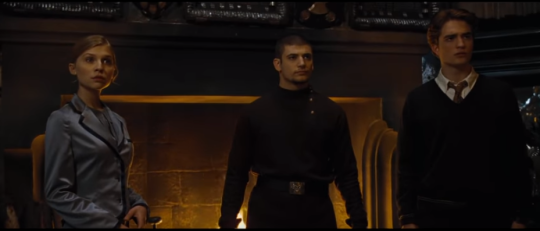
Ok well Krum just looks Grumpy but Fleur does a great shifty-eye thing and Cedric there looks like his agent just said the words “Stephanie Meyer liked your callback.”
Then Dumbley-dorr bursts in and we get his infamous line read. The scene goes on, and pretty much everybody (Dumbles included) acts very shouty about it. There’s a moment where the shouting stops and Moody points out that it’s more likely a Dark Wizard tampered with the goblet than lil Harry Potter the 14-year-old. The penultimate shot shows Barty Crouch saying Potter is now legally bound to compete, and the last shot is Harry, surrounded by all these old silvery trophies, holding his slip of paper, all by himself.
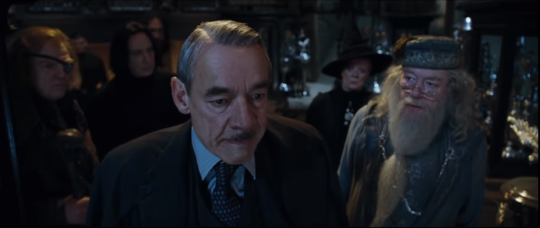
There’s actually some pretty nice 7/10 directing going on here. Look how this shot in particular is looking down on all the adults present, making them look small and helpless. This scene builds to, and ends on, Crouch’s line, which is a horribly sinister fact that the book actually glosses over quite a bit:
“The Goblet of Fire constitutes a binding magical contract. Mr. Potter has no choice. He is, as of tonight, a Triwizard Champion.”
He has no choice. JK’s vague on this and so is the movie, but for me the implication is either Harry competes or he dies, as if the Goblet is similar to an Unbreakable Vow. Either that or he like...lacks the free will to do otherwise so he’ll just show up at each test and....idk compete as an independent like he’s Jill Stein or something.
Every other part of this scene - Dumbledore’s anger, the surprise and confusion in the other champions, and the brief pause where Moody suggests that a dark wizard had something to do with Harry’s name being chosen - creates a suspenseful question that leads to an answer-bomb. The question is, “why is everyone so freaked out?” The answer is, “because somebody extremely powerful manipulated a magical artifact into binding Harry Potter into a competition that will potentially kill him.” While the book chapter focuses on Harry’s own loneliness and frustration, the movie scene focuses on the fact that someone at Hogwarts is orchestrating a murder plot for a fourteen-year-old. And it’s not a straightforward murder plot - Harry might not necessarily die - which means that something else might be going on, something nobody in the room can guess at.
And they’re right to be paranoid, because in case you all forgot the direct consequence of this scene is the resurrection of Voldemort. So yeah, oh fuck. I’ll repeat that this is a neat new highlighting of an aspect that JK glosses over - there’s something really fucked up going on here and someone really fucked up behind the scenes.
But when some people went into the theatre (Goblet of Fire books open on their laps to follow along, I imagine), they didn’t see the new facet of this scene that the movie brought to light, or how these directing choices cleverly streamline and underline the mystery of the goblet sabotage.
They saw one. adverb. Calmly.
2) Gambon’s Dumbledore is already different from book Dumbledore
So you might argue that this re-interpretation of the scene is fine, but maybe it didn’t need Gambon’s aggressive line read to make it work. I’d still disagree, and I’ll explain why.
I remember really liking the first Harry Potter movie, probably because I was....uh......eight or nine when it came out, so I was still a kid and a Harry Potter Nut. One of the things I remember the most vividly is a trifecta of castings that were so perfect it felt like the characters had just manifested straight out of the book. Discounting the adorable eleven-year-old golden trio, you might be able to guess them: Alan Rickman, Maggie Smith, and Richard Harris (and honourable mention to Robbie Coltrane who is great but who I won’t return to in the arguments later spoilers spoilers).

Bonus Professor Sprout cuz I’m too lazy to find another group image.
This casting is stupidly perfect. Every word out of their mouths feels like it has been ordained by the god of Rowling. Even so many years later I’m stunned by it.
Tragically, Richard Harris died before the third movie could be filmed. (RIP Dumbledad, you were a magnificent actor and did you know he starred in a Jaws ripoff about a murderous Orca holy shit I have mad respect for him now).
If Richard Harris had survived to play Dumbledore in films three and four, perhaps the scene would have stuck more to the original “calmly” line read, because Richard Harris delivered every single one of his lines like he was reading a bedtime story about unicorns to eight-year-old children - which in many ways, he was.
But the scene wouldn’t have been as good.
I am of the generation that grew up with Harry Potter, and it really was an experience of growing up, all the terrible parts included. The first two books and the first two movies - despite having some really dark moments in them, see: murdersnake - exist in this pre-adolescent haze of dreamy childhood fantasy. That’s exactly the place you want a dreamy grandpa Dumbledore.
By the time the fourth movie came out, we were all waiting on the seventh book. Cedric had died. Sirius had died. Dumbledore had died, both in the books and in real life (seriously if you make the mistake of thinking this argument is an anti-Richard Harris one you can go get bit by a murdersnake). The world was still full of magic but also a lot more complicated, and we were starting to realize that by the time the first dark-ish movie - The Prisoner of Azkaban - needed to cast a new Dumbledore.
So yeah, Gambon’s Dumbledore had less of a dreamy wizard-dad quality to him - a bit more kookiness on the one hand, a bit more rage and emotion on the other. But Harry Potter had moved in that way too, and we also learned that Dumbledore could be a scheming bastard at times. I’m not saying “BRING ME EDGY METAL DUMBLEDORE”, unless I am proposing that you read My Immortal, which now that I think about it is something I am definitely doing.
What I am actually saying is that this angry moment is just a different choice for a different Dumbledore, which makes sense for the actor playing him. He’s not as kind and magical, but he’s way more unpredictable and intimidating. And this Dumbledore doesn’t exactly resemble the Calmly Book Dumbledore, but he does resemble the Dumbledore that is always implied, the one we never really meet - the one who was friends with a dark wizard before defeating him, and who is prepared to sacrifice a teenager for the greater god.
Related to this point, while we have our Perfect McGonagall Smiths and our Severus Snape Incarnates (and our Kenneth Branaghs playing Lockhart afjdkslfjdsklfjsd), a few of the casting choices in later films actually added some intrigue to smaller characters by making them more distinctive. I think this works great with evil characters. Wormtail and Lucius Malfoy are good examples of characters who were meh to me in the books but vivid as hell in the films, but the best example is actually again from Goblet of Fire. It’s the Doctor!
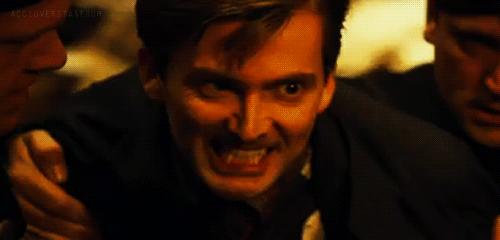
Barty Crouch Jr. was a nothing entity in Goblet of Fire The Book Version You Love So Much. He was a plot device at best and I envisioned an empty shadow where a character should have been. On the contrary, David Tennant is a stellar actor who makes a plot-device villain unforgettable. I completely understand people who might watch Doctor Who just for him (even though I’ve only seen a handful of episodes from different seasons myself) because he actually is that good. I remember that little tongue flick more than I remember the entire dragon fight in the Goblet of Fire movie. No exaggeration. If you asked me to point to one way in which this movie was definitively better than the book I would literally just link you to this gif.
My point in bringing up Barty, and in contrasting Richard Harris and Michael Gambon, is that sometimes adherence to the book characters is great. That’s what gives us Snape, McGonagall, and Dumbledore V.1. But it also doesn’t hurt to reinterpret, because sometimes you stumble upon something really brilliant. Gambon!Dumbledore isn’t a Motherfuckin’ Scene-Stealer like Doctor Jr there, but he is, in my view, a necessary re-interpretation of a character who would eventually have to film this fucking scene.
Although thinking about this in hindsight, fuck would I have given anything to see Richard Harris’s take on that. And also to watch him fight an Orca, but luckily I can probably just stream that one illegally somewhere.
3) It makes way more sense for Dumbledore to be upset in context.
This one is kind of a short and very meta point. The Half-Blood Prince actually changes a lot about Dumbledore, sad-drunk Horcrux scene aside. The big thing is that we understand his motivations after putting pieces from OOTP and HBP together. He needs to keep Harry alive because there’s a prophecy that dictates he’s the only one who can kill Voldemort - perhaps he suspects or even knows this is because of the Horcruxes, and because Harry is one. Fans figured this last part out, too - or speculated as much.
In the original Goblet of Fire, when we were all still young and innocent and Dumbledad was still kind of Richard-Harris-y in most of our minds, yes, he would say did-you-put-your-name-in-the-goblet-of-fire calmly. But we all knew more about Dumbledore by then. And since we did, we can re-contextualize why he’s so upset in asking that question, and if you think about it without being glued to your citations it makes so much more sense.
Harry must live long enough to beat Voldemort, or nobody will beat Voldemort. Dumbledore knows this. And in this scene, one of two things has just happened. One, Harry has somehow been clever enough to bypass the Age Line, drawing a crazy amount of attention to himself and volunteering for a potentially lethal tournament. Not only is that terrible because now even Harry is trying to kill Harry, but also if he did pass the Age Line Harry would be secretly brilliant, and remember the last time Dumbledore quasi-mentored an insanely creative and curious and talented Parseltongue-speaking wizard O H W A IT. Still, even worse than that option is the potential that someone has infiltrated Hogwarts with the explicit purpose of killing Harry. Yeah, Harry’s life has been in danger before, but usually because Harry’s stupid and seeks it out (see: Philosopher’s Stone) or gets in the way of evil plans that are targeting other people (see: Chamber of Murdersnake). This is the first time the threat is so direct, and the first time Dumbledore’s so powerless to stop it, because the Goblet is magically binding. This could seriously fuck Dumbledore’s plans, and by now, the audience is aware of this, because so many of them have read the books.
I think, when Dumbles asks if Harry put his name in, he's hoping for a yes. Then, at least, there wouldn’t be a dark wizard potentially looking to murder Harry running loose in the school. And no it’s not the nicest thing to do but he’s probably trying to scare Harry into that yes. You better damn well just be a stupid, egotistical kid, Harry, and not a PAWN IN THE RESURRECTION OF A DARK LORD
or I guess....maybe you could be both.
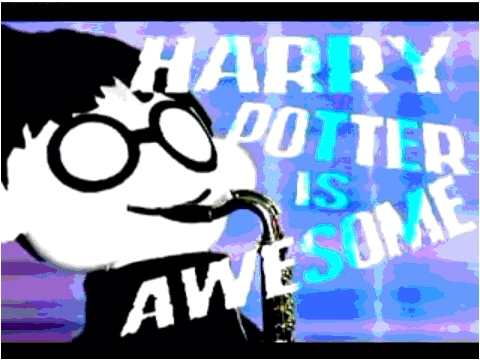
you can keep your Very Potter Musical b/c The Mysterious Ticking Noise is still the best HP song ever written and that’s my professional serious academic onion.
4) The most memorable parts of the entire film series are moments when the films surprise us by being different from the books.
So, the last point is a bit more of a subjective one, and it may sound like a cheap “gotcha” take, but it’s still important. I told you that I remember nothing about the dragon fight and that was honestly true. I remember the lake test because it’s a bit weirder and more striking. And you, and I, and the internet, remember DIDJAPUTYERNAMEINHTEGABLAT because it caught people off guard and fucked with their citations.
It’s been a long, long time since even the last Harry Potter film came out. Six years since it disappointed us by keeping that disappointing epilogue. If you asked me now what moments I remember the most vividly from the series, they come in two varieties. Half of them are moments where I thought “wow, this is exactly what I pictured, this is incredible, I’m having a nostalgia.” Mostly these are from the earlier movies, so you have things like the first boat approach to Hogwarts, the Patronus scenes in the third movie, and Ms. Norris hanging petrified from the torch (Chamber of Secrets is actually my favourite of all the books, by the way).
But the moments I remember from the later movies are things that definitely weren’t in the books. This is partly because the later books feature less vivid imagery, since they’re in a world that’s already concretely established, but also because these moments were some of the few surprises left in a franchise that the world had been obsessed with for literally my entire life - or at least as far back as I could remember.
This is where I’m going to bring back Jean Brodie and Hans Gruber, like I promised I would. Yes, Snape and McGonagall are picture-perfect to how I saw them in the books, but the moments I associate with each of them most strongly are not. For Maggie, it’s when she pulls out all the CGI stops and goes Dark Souls Boss on us by animating a bunch of statues, and then says:
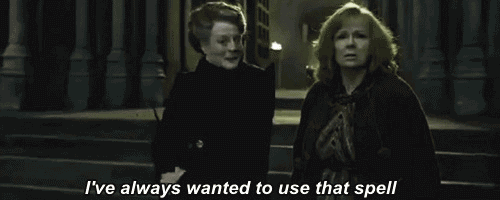
Obviously that’s a huge scene and quite memorable regardless. But for Alan, it’s literally just this reaction in the Half-Blood Prince, straight from the Handbook of Vax’ildan’s Foolproof Conversation Strategies:

Despite coming from the two most book-adherent performances, these moments are not in the books (to my knowledge). They’re surprising, funny, in-character, and while arguments can be made either way as to whether they’re ‘quality cinema’ (I stand by my solid 7/10) the fact remains that they are memorable. There is nothing more “Snape” than the tempo of that pause, the perfect idgaf expression on Alan Rickman’s face, and the exact pace at which he buggers off because he has better things to do. And that scene is what I picture when I picture Snape, and I will never, never forget it. (RIP to you too, sir. Alan Rickman’s is the best performance in the entire series....memes and all..........)

You might disagree. You might remember something entirely different from the books, because memory, love, and nostalgia are all different for different people.
But I think my fond memories also come from the fact that I don’t look at the films the same way people who document literally every difference do - the same way that people upset about GOBLETOFFAGAAGH do. They are looking for a direct translation, book to movie - which is not only often impossible, but very often boring.
When you get mad about a single line read because it defies a single adverb in order to make a better scene, you need to lift your eyes from the page and look a little more closely at what the screen is doing. Sometimes it is doing incredible, expansive things to the story you love. It might seem hypocritical for me to say this, since I wrote an essay for like three hours about why this single moment doesn’t bother me, but I am doing so particularly because I’m using it to represent a larger problem that emerges from fans focusing so closely on tiny changes.
(And no, I’m not railing against people who are upset about things like how Ron’s character was interpreted poorly across the movies. That’s a fine thing to criticize because it makes the movies worse too.)
No, Michael Gambon getting angrier in one line is not an example of an earth-shattering reinterpretation of Harry Potter, but it is a good reinterpretation, and far from an earth-shattering mistake. Sometimes the movies are only doing slightly more hilarious or memorable or logical things to the stories you love, and that’s also worth appreciating. That’s really what it comes down to - an appreciation for how things can change, how they should change, and how they do change. I think you can learn more by understanding the difference between the two media, and thinking more critically about what changes and why, and I guarantee you will enjoy movies more by letting them do their thing.
And in conclusion, if you do wanna talk about a stupid line read from the films....there’s always this gem:
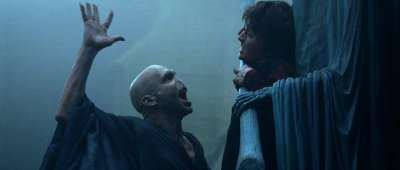
“AYYYYE CAN......TOUCH U.....NAO.”
Now I eagerly await your thousand-word essay on why this line is also really great :D I’m not even kidding, feel free!
#harry potter#harry potter and the goblet of fire#hp#gof#I NEED TO CHILL but also#I found this weirdly relaxing
1K notes
·
View notes
Text
Little Red Writing Module 1
Module 1: Little Red Writing
Genre:
Little Red Writing was listed under “books about reading” and believe this book is humorous parody of Little Red Riding Hood. Since this is a retelling of a popular fairytale in a teachable grammar instruction it is a good representation of book about reading to create stories. The humor used in the story, such as the name of the city Pencilvania and vocabulary used would grab a grammar student’s interest as they read or listen as the story unfolds. The relatable story plot is fill with anticipation, leaving the reader or listener to compare what will happen next. The illustration and the engaging funny character brings teachable moments to help anyone to write better.
Book Summary:
The main character Little Red which is a red pencil was given an assignment by her teacher Ms. 2. Little Red wants to write an adventurous story. She sets out to discover a story at her school and starts down a path with a basket of nouns, searching for a special story that includes bravery by battling evil. As she roams her school she approaches action words, adjectives, adverb, verbs and more. Little red remind herself she must stay on the path as she creates her adventurous story-the author offers humor along the way. Example of humor would be the villain is a pencil sharpener, with an electrical cord, and the forest is the school library. She saves the day with a noun.
APA Reference of Book:
Holub, Joan. 2013. Little red writing. San Francisco, CA: Chronicle Books.
Impressions
The story was enjoyed by myself and granddaughter who loves to write. The story emphasized the use of grammar and how powerful word can be used to make teachable moments. The descriptive illustrations caboose the text giving instructions on how to write in a fun humorous way. Since this is a loved fairytale, relating to the story as it unfolds demonstrates how nouns are used, advising how to become creative in your writing. From the young reader to the old, each will enjoy this story from different views. Such as a young reader would enjoy the illustrations and an older viewer would probably enjoy the parody and word use. This book is engaging in that aspect.
Professional Review:
Booklist Reviews
In this frothy literary folly, parts of speech, pieces of punctuation, and elements of style are sliced and diced and reassembled along the familiar route Little Red Riding Hood took to visit her grandmother. This time around, Ms. 2 informs her class of pencils that they're writing a story, and Little Red sets off with her basket of 15 words. Along the way she cuts through a dense forest of description, interrupts the run-ons of Conjunction Glue, and verbs her way to Principal Granny's office, just in time to foil the electrical teeth of the Wolf 3000 pencil sharpener before rescuing the shorter-than-before principal and returning to class to tell her tale. Holub's circular story, more about the act of telling than the tale itself, finds enthusiastic interpretation in Sweet's vivid, colorful visual chaos. Words abound, forming the tight font of the narrative, filling in the handwritten word balloons, and decorating the remaining real estate of the school's walls, signs, cupboards, and bulletin boards. The resulting confusion makes for an easy, winning prompt for beginning writers to abandon their fears and take up pencils of their own. Copyright 2013 Booklist Reviews.
APA Reference of Professional Review:
Baker & Taylor. 2013. Little red writing review. Retrieved from http://contentcafe2.btol.com/ContentCafeClient/ReviewsDetailID.aspx?ID=2377130
Library Uses:
I suggestion this book would be useful in the homework center. Possibly tutor center and literacy programs as well. The item would be a fun way to introduce parts of speech for writing for young and old.
Readalikes:
The view I would like to take on similar books like Little Red Writing would be Max”s Words, Nouns and Verbs Have a Field Day and Up, Up and Away.
I chose Max’s Words, by Kate Banks, because the plot appeared to be like Little Red. Little Red wanted a great story and different from her classmates. Her classmates decided on non-fiction and related to the type of pencil they were. Also, the book delivered lessons on the use of words in a fun way, while Max’s Words also had word use and Max wanted to have a collection just like his brothers. Max created sentences with his words. Little Red created sentences into a story. The illustrations in both books presented aids as well in complemented the text for ease in reading the story.
Nouns and Verbs Have a Field Day, by Robin Pulver, is a fun way to understand the power of the parts of speech. I felt this was one that was similar because of the content of the story, which gives an example of the job that nouns and verbs must be display to the reader.
Up, Up and Way, by Ruth Heller, where she simply uses adverbs just like Little Red Writing’s story. This book re-enforces Holub’s story with a book focused on adverbs. These books will all serve sufficiently in the homework center, tutor center as well in a literacy program held at any library or school.
1 note
·
View note
Text
Module 1 Little Red Writing
Module 1: Little Red Writing
Genre:
Little Red Writing was listed under “books about reading” and believe this book is humorous parody of Little Red Riding Hood. Since this is a retelling of a popular fairy-tale in a teachable grammar instruction it is a good representation of book about reading to create stories. The humor used in the story, such as the name of the city Pencilvania and vocabulary used would grab a grammar student’s interest as they read or listen as the story unfolds. The relatable story plot is fill with anticipation, leaving the reader or listener to compare what will happen next. The illustration and the engaging funny character brings teachable moments to help anyone to write better.
Book Summary:
The main character Little Red which is a red pencil was given an assignment by her teacher Ms. 2. Little Red wants to write an adventurous story. She sets out to discover a story at her school and starts down a path with a basket of nouns, searching for a special story that includes bravery by battling evil. As she roams her school she approaches action words, adjectives, adverb, verbs and more. Little red remind herself she must stay on the path as she creates her adventurous story-the author offers humor along the way. Example of humor would be the villain is a pencil sharpener, with an electrical cord, and the forest is the school library. She saves the day with a noun.
APA Reference of Book:
Holub, Joan. 2013. Little red writing. San Francisco, CA: Chronicle Books.
Impressions:
The story was enjoyed by myself and granddaughter who loves to write. The story emphasized the use of grammar and how powerful word can be used to make teachable moments. The descriptive illustrations caboose the text giving instructions on how to write in a fun humorous way. Since this is a loved fairy-tale, relating to the story as it unfolds demonstrates how nouns are used, advising how to become creative in your writing. From the young reader to the old, each will enjoy this story from different views. Such as a young reader would enjoy the illustrations and an older viewer would probably enjoy the parody and word use. This book is engaging in that aspect.
Professional Review:
Booklist Reviews
In this frothy literary folly, parts of speech, pieces of punctuation, and elements of style are sliced and diced and reassembled along the familiar route Little Red Riding Hood took to visit her grandmother. This time around, Ms. 2 informs her class of pencils that they're writing a story, and Little Red sets off with her basket of 15 words. Along the way she cuts through a dense forest of description, interrupts the run-ons of Conjunction Glue, and verbs her way to Principal Granny's office, just in time to foil the electrical teeth of the Wolf 3000 pencil sharpener before rescuing the shorter-than-before principal and returning to class to tell her tale. Holub's circular story, more about the act of telling than the tale itself, finds enthusiastic interpretation in Sweet's vivid, colorful visual chaos. Words abound, forming the tight font of the narrative, filling in the handwritten word balloons, and decorating the remaining real estate of the school's walls, signs, cupboards, and bulletin boards. The resulting confusion makes for an easy, winning prompt for beginning writers to abandon their fears and take up pencils of their own. Copyright 2013 Booklist Reviews.
APA Reference of Professional Review:
Baker & Taylor. 2013. Little red writing review. Retrieved from http://contentcafe2.btol.com/ContentCafeClient/ReviewsDetailID.aspx?ID=2377130
Library Uses:
I suggestion this book would be useful in the homework center. Possibly tutor center and literacy programs as well. The item would be a fun way to introduce parts of speech for writing for young and old.
Readalikes:
The view I would like to take on similar books like Little Red Writing would be Max”s Words, Nouns and Verbs Have a Field Day and Up, Up and Away.
I chose Max’s Words, by Kate Banks, because the plot appeared to be like Little Red. Little Red wanted a great story and different from her classmates. Her classmates decided on non-fiction and related to the type of pencil they were. Also, the book delivered lessons on the use of words in a fun way, while Max’s Words also had word use and Max wanted to have a collection just like his brothers. Max created sentences with his words. Little Red created sentences into a story. The illustrations in both books presented aids as well in complemented the text for ease in reading the story.
Nouns and Verbs Have a Field Day, by Robin Pulver, is a fun way to understand the power of the parts of speech. I felt this was one that was similar because of the content of the story, which gives an example of the job that nouns and verbs must be display to the reader.
Up, Up and Way, by Ruth Heller, where she simply uses adverbs just like Little Red Writing’s story. This book re-enforces Holub’s story with a book focused on adverbs. These books will all serve sufficiently in the homework center, tutor center as well in a literacy program held at any library or school.
0 notes